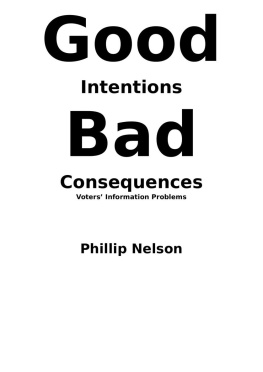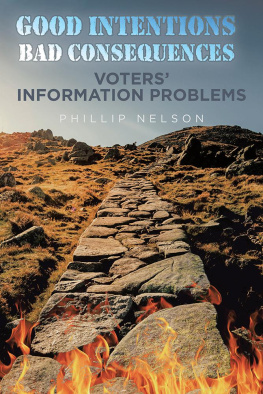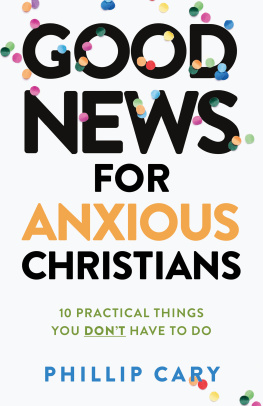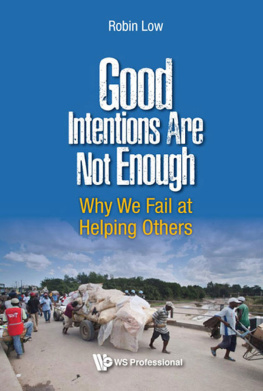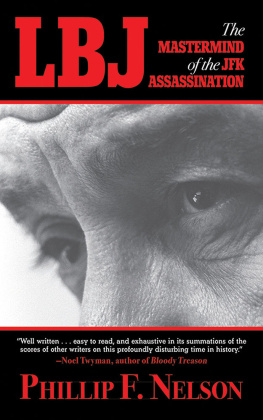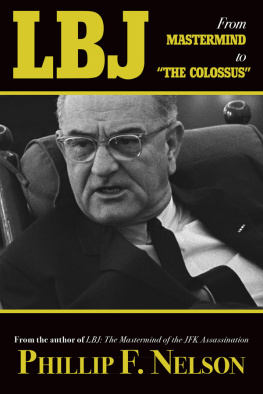Good
Intentions
Bad
Consequences
Voters Information Problems
Phillip Nelson
Copyright 2021 by Phillip Nelson
___________________________________________________
All rights reserved. This book or any portion thereof may not be reproduced or transmitted in any form or manner, electronic or mechanical, including photocopying, recording, or by any information storage or retrieval system, without the express written permission of the copyright owner except for the use of brief quotations in a book review or other noncommercial uses permitted by copyright law.
___________________________________________________
Created in the United States of America
Library of Congress Control Number: 2020907470
ISBN: Softcover 978-1-64908-151-3
Hardback 978-1-63871-494-1
eBook 978-1-64908-150-6
Republished by: PageTurner Press and Media LLC
Publication Date: 08/26/2021
___________________________________________________
To order copies of this book, contact:
PageTurner Press and Media
Phone: 1-888-447-9651
info@pageturner.us
www.pageturner.us
TA BLE OF CONTENTS
CHAPTER OVERVIEW
CHAPTER 2 SELF-INTEREST, TRADITIONS AND NA VE ALTRUISM
How these three fundamental voter concerns arose in the context of voters incentive to imitate their associates. Nave altruism is concern for others without taking into account the unintended consequences of any policy. I argue that this is the initial kind of altruism that is sustained by confirmation bias, preferring evidence that agrees with previous beliefs.
CHAPTER 3 COLLEGES: THE HEARTLAND OF NA VE ALTRUISM
The emphasis is on the differences by fields in professor behavior. The claim is that those differences provide insight into the motivations governing professors political preferences. Of particular importance is the difference between the political preferences of economists and the rest of the social sciences and the humanities. I defend the proposition that this difference is attributable to the nave altruism of the latter. I then look at the impact of the college experience on its students, particularly lawyers, journalists, and teachers, both college and non-college.
CHAPTER 4 EVIDENCE: NAVE ALTRUISM AND INFORMATION
Nave altruists understate the monetary costs of the policies they prefer and prefer them less when informed of the true costs. Similarly, most Americans are in favor of higher minimum wages without examining the unintended consequences of that policy. When informed of those consequences their support of that policy is significantly reduced.
CHAPTER 5 EVIDENCE OF THE G REAT DIVIDE
This chapter shows how some commonly observed characteristics of voting behavior in the United States can be explained by the processes on which this book focuses: the liberalism of urban areas, the increase in conservatism with age, and the conservatism associated with church attendance and how those associations can be reversed under special circumstances.
CHAPTER POLICY
This chapter defends a somewhat different approach to value statements. It starts with a value tautology: for the purpose of giving people what they want we define good as what people would want if they had sufficient information. The important proposition in that chapter is that there would be less nave altruists if they were informed about the unintended consequences of their policy preferences.
CHAPTER 7 DEMOCRACY
Even with sufficient information there will be individual differences in political preferences. There is general agreement that the democratic ideal would be the appropriate way to resolve those differences. Representative democracy with the rule of law is the best approximation we have to that ideal. We examine what that tells us about appropriate policy.
CHAPTER 8 EXAMINING LI BERAL IDEAS
This chapter looks at two liberal ideas. First, that the rich have too much influence in determining government redistribution. It shows that the rich have less power in determining redistribution by income classes. Instead its power is focused on special interest returns.
Second, that concern with status creates a negative income externality, which helps to justify government redistribution and environmental policy. The chapter shows that there are many processes that produce a positive externality, in particular the increased trust produced by higher income and the increased risk taken by higher income groups. There are also features of the status market that produce positive income externalities.
APPEND IX STATUS
APPENDIX UNINTENDED C ONSEQUENCES
REFERENCES 219
Endnotes 228
CHAPTER 1
OVERVIEW
P olitical scientists have written extensively about voters lack of information, but they have ignored one of the most important voter information problems: lack of information about the consequences of the policies they advocate. This problem is particularly severe among voters who want to do good but are uninformed about essential features of their attempts to do so. It is the information problems of that group of voters that generates the main distinction between what voters intend and the consequences these intentions produce.
The disagreement between liberals and conservatives about economic policy is focused on two questions. Should governments spend more directly and indirectly on protecting the environment? Should governments redistribute more income to the poor and away from the wealthy? Answers to these questions are of more than passing interest to social scientists and citizens alike.
In logic these answers require a comparison of what is and what is better, and some feasible path to get toward the latter from the former. Better information is the path advocated in this book. It is feasible because it does not require voters to acquire more information than they have incentives to acquire, just better information, which need not be more expensiv e information.
For the most part, the economics literature has used a simple self-interest model to explain political choices, and certain features of political preferences are consistent with that model such as the direct relationship between income and votes for Republicans. But that is not the whole story, and this book focuses on the rest of the story. Both self-interest and altruism affect voter decisions. However, both of these motivations will be somewhat muted because they both focus on the policy consequences of voting. Any individual voter has a negligible effect on those consequences because his vote has a negligible impact on voting outcomes. In contrast, voters are primarily interested in others reaction to their vote and how they view themselves, largely a function of others potential reactions. As a result, self-interest does not play the dominant role in determining political decisions that it plays in determining market decisions. The political position of limousine liberals is the most obvious deviation from the income determinant of political choice by way of self-interest. Indeed, Nelson and Greene, 2003 found that self-interest variables were less important than other variables in determining political positions. But still self-interest plays a role in voter choice, just not the overwhelming role it plays in ma rket decisions.
The reason self-interest and altruism affects voter decisions at all is that voter preferences are simply extensions of the preferences they express in conversation, and people do talk about their self-interested preferences and their notions of what is good for the world and their country. These latter notions of what is good are often influenced by self-interest, but not always.

